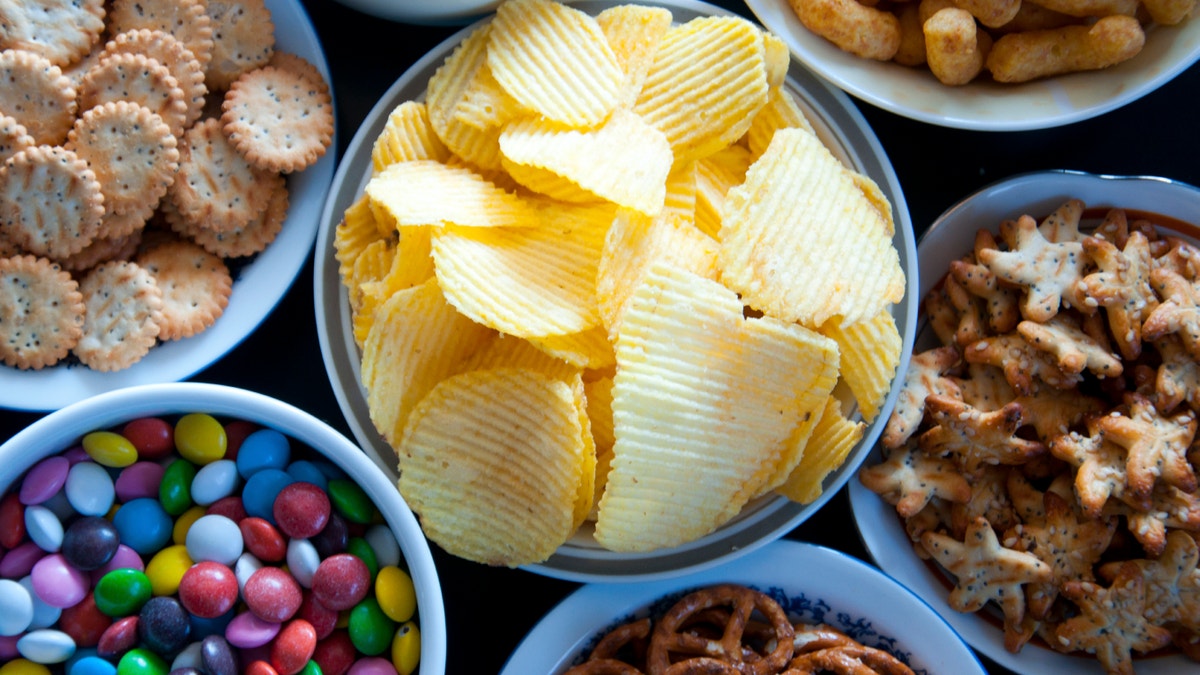
Salty snacks (iStock)
Salt is impossible to avoid, no matter how hard you try. If you’ve eaten food prepared by someone other than yourself, you’ve probably eaten more salt than you should; if you’ve eaten food prepared by yourself, you’ve probably done it too. The good news is you definitely have to have some salt in your diet — but probably not as much as you’d wish.
The human body needs 200 milligrams of sodium, or about .5 grams of salt, a day to function properly, but according to the American Heart Association, the average American consumes 3,436 milligrams of salt daily. So how exactly are we managing roughly 17 times the amount of sodium we need? Probably a combination of not really knowing what’s in our food, not understanding how much is safe, and being way too accustomed to the taste of salt itself, which a lot of people consider necessary to “bring out” flavors to begin with. Here are a few ways salt can be dangerous and some ways to reduce the levels in your life.
Too much salt can cause fluid imbalance
Balancing sodium, potassium and fluid inside your body is tricky, and too much salt can seriously mess with an already delicate process because that process requires proper filtration through your kidneys. When there’s extra fluid in your blood, your kidneys use osmosis to pull the excess water out, which travels to your bladder and is removed through urine, keeping the amount of sodium and water in your blood in check. But too much sodium in your blood can mess with your kidneys' ability to pull water out as it now needs to stay in the blood to dilute sodium.
Related: 5 Ways To Avoid A Very Sketchy Chemical Hiding In Your Food
Drinking eight glasses of water a day is possibly the most overused piece of advice ever given, but that’s because hydration is so important — and you should try to get a couple of more glasses in if you’re consuming excess amounts of salt to help make up for the water lost to the battle in your blood.
Excess water brought into the blood for sodium dilution increases the blood’s volume, which you definitely do not want because that can put extra pressure on your heart and arteries. (Hello, high blood pressure!)
Too much salt wreaks havoc on your heart
High blood pressure from too much salt can lead to a whole lot of messy complications, including the weakening and damage of your arteries, heart, and other organs, and an increase in your risk of coronary heart disease, heart failure, stroke and kidney failure. It’s not hard to measure your blood pressure — it’s always done at doctor’s visits, and getting regular checkups is a must no matter what your blood pressure is doing.
If high blood pressure runs in your family, cutting down on your salt intake is a great way to reduce your risk of the complications that come with it.
Too much salt can also cause bloating
Beyond the more serious and dangerous effects, too much sodium in your diet can also cause bloating because it causes you to retain extra water. Bloating is temporary, but can be uncomfortable and frustrating, so avoid salt if you’re planning on being in a situation where bloating would bother you.
It’s not impossible to take excess salt out of your life, but it might take some readjusting. Comfort foods like Chinese takeout, which in America usually replaces traditional ingredients like garlic, ginger, and other seasoning with salt and MSG, can be the most offensive to your arteries, but it helps to know what your choices are. Replace staples like wonton soup, which can have about 905 milligrams of sodium in a cup, or General Tso's chicken, which contains about 2,327 milligrams of sodium in one order, according to the USDA nutrient database, with more low-sodium menu options (spring rolls have only about 300 milligrams of sodium in them, for instance).
If you’re cooking on your own, avoid canned beans or vegetables, or buy the options made without salt. Look for other ways to increase flavor, like red pepper, garlic, or onions, all of which happen to be great for you and won’t increase your sodium intake. A big part of getting excess sodium out of your life is getting used to food with other flavors, so feel free to go crazy with the cayenne or curry powder — your arteries, and eventually your taste buds, will thank you.
MORE FROM TEEN VOGUE:
More Than Half of What You Eat Isn’t Even Real Food, Study Finds
14 Fun Facts About Boobs You Probably Didn't Know
Former First Lady Nancy Reagan Watched Thousands of LGBTQ People Die of AIDS








































